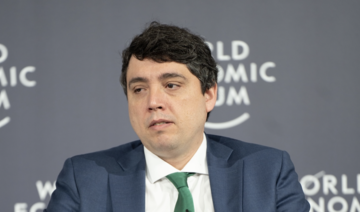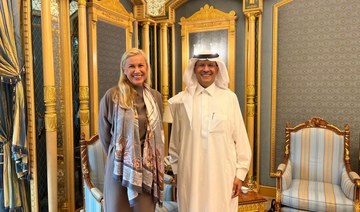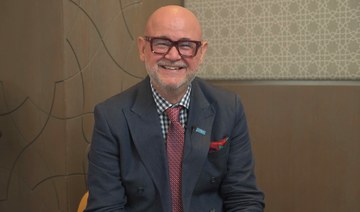KARACHI: Pakistan’s currency on Tuesday continued its free fall for the fourth straight trading day in the interbank and open markets by hitting 153.50 and 154 against the dollar respectively, following a “market-determined” rate for the rupee demanded by the International Monetary Fund as a condition for a recently signed bailout package.
The sliding rupee has caused alarm in Pakistan, which is already facing inflation likely to average over 7 percent for the year and surging costs for fuel and power, which are both heavily influenced by the dollar exchange rate.
The latest drop in the exchange rate follows a new financial assistance package announced by the IMF on May 12, which has eroded the value of the rupee by 8.5 percent. This is Pakistan’s 13th IMF bailout.
The Pakistani currency has also depreciated by Rs0.50 to Rs40.70 against the Saudi Riyal and Rs0.40 to Rs41.50 against the Arab Emirate Dirham.
“We were expecting that the rupee would hit 153 by the end of current year but that level has been achieved much before,” said Samiullah Tariq, the head of Research at Arif Habib Limited. “There is too much volatility in the market and we are unable to understand what is on their (government’s) mind.”
“The buying activity in the open market is comparatively low amid high demand for the greenback,” said Malik Bostan, the president of Forex Association of Pakistan. “A panic-like situation can be seen in the interbank market.”
On Monday, Pakistan’s central bank raised its key interest rate by 150 basis points to 12.25% on Monday, citing inflationary pressures, exchange rate depreciation and an elevated fiscal deficit
Pakistani traders believe the interest rate hike coupled with the devaluation of the rupee will drive many Pakistani industrialists out of business.
“The government is implementing the IMF’s terms before the deal is even signed,” opposition Pakistan Peoples Party senator Sherry Rehman said in a statement on Tuesday. “This is also evident in the unabated increase in the dollar rate which has seen the rupee plummet to Rs. 152 in the open market.”
The IMF agreement still needs to be ratified by the Fund’s board in Washington.
“All this devaluation is going to make paying back our debt an onerous task,” Rehman said. “It appears that the government is nothing more than a silent spectator in front of the IMF. Every step it is taking seems to be an effort to please a few. Its haphazard decisions are wrecking the economy.”
At present, the Pakistani currency, which many analysts consider overvalued, is managed by the central bank in a de facto controlled float.
The State Bank of Pakistan said on Tuesday it was watching the foreign exchange market closely and would act in the case of “unwarranted” volatility.
It said the recent slide “reflects the continuing resolution of accumulated imbalances of the past and some role of supply and demand factors.”
In continuous freefall, Pakistani rupee hits 154 in the open market
In continuous freefall, Pakistani rupee hits 154 in the open market
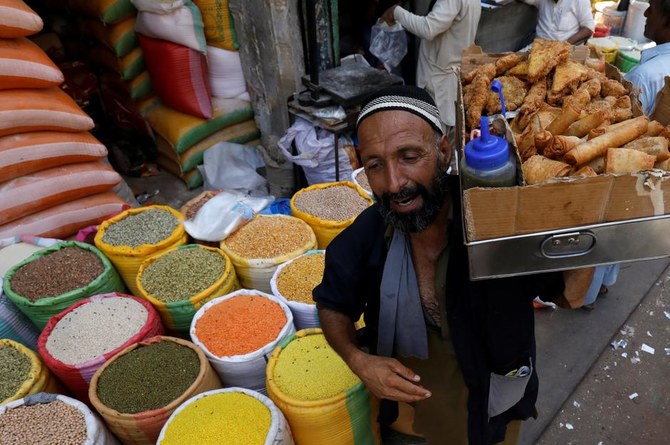
- Currency at 153.50 in the interbank market, a record new low
- Latest drop in exchange rate follows $6 billion IMF bailout announced on May 12
Saudi chemicals giant SABIC targeting net zero by 2050, CEO says
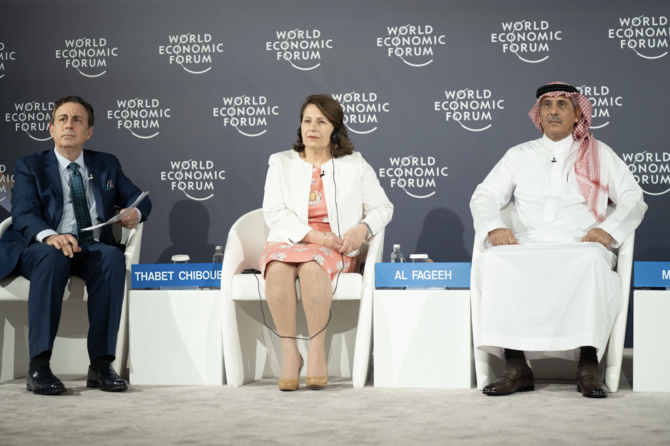
- SABIC aims to convert 1 million tons of waste into feedstock for the petrochemical industry by 2030, Al-Fageeh said
RIYADH: Saudi Arabia’s top chemicals company is turning to circular economy solutions to reach carbon neutrality by 2050 and advance the Kingdom’s net-zero agenda, its CEO has said.
Abdulrahman Al-Fageeh, CEO of the Saudi Basic Industries Corporation, was speaking at the “Demand for Energy ... Transforming Costs into Gains” panel during the special meeting of the World Economic Forum in Riyadh.
SABIC aims to convert 1 million tons of waste into feedstock for the petrochemical industry by 2030, he said.
The circular carbon economy has helped the chemicals sector expand its investment horizon since 2020, he added.
Al-Fageeh said that SABIC marked achievements in energy efficiency and reduced its carbon footprint at the end of 2023 by 12.74 percent. The company is targeting carbon neutrality by 2050.
SABIC has also adopted alternative energy from plastic waste, seeking to produce 1 million tons of sustainably sourced chemicals by 2030.
Energy efficiency
Al-Fageeh said that his company had started sustainability programs at an early stage, improved reliability, developed 90 initiatives and projects, and closed a number of sites due to ineffectiveness.
In 2023, SABIC had more than 200 patents, 40 percent of which related to sustainability in energy efficiency.
Concierge robots set to become reality in the hospitality sector
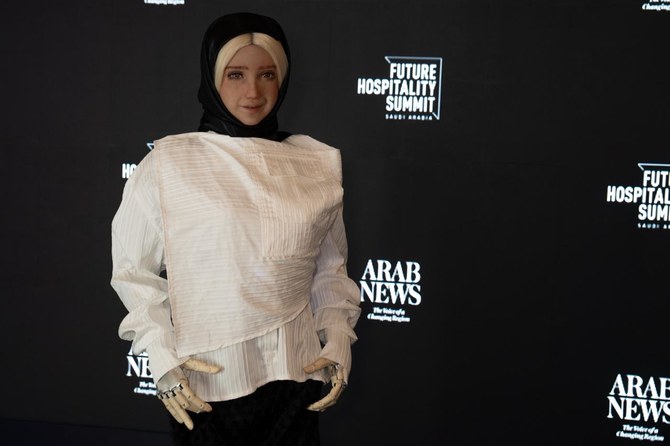
RIYADH: A personal robot concierge is set to become a reality as a new wave of technological innovation takes the spotlight during the Future Hospitality Summit in Riyadh.
In an interview with Arab News during the event, Janet Adams, chief operating officer of global artificial intelligence company SingularityNET, shared details about a new humanoid robot expected to revolutionize the hospitality sector.
“One of our projects which we are pioneering right now is the development of a new class of humanoid robots specifically designed for the service industries,” Adam told Arab News.
“Imagine going to stay in a hotel where you’ve connected with your robot before you go there. They know everything you want. They can greet you at the door because you’ve been chatting as an avatar,” she said.
“And then after you leave, they can stay in touch with you and they can be like a loyalty ambassador, robotic avatar, friend for life who understands your needs, who understands what you enjoy, who makes everything perfect for you in your stay in the hospitality industry,” Adams added.

She further explained that the development, known as the Mind Children project, will roll out its pilot in early 2025.
Furthermore, Adams shared that the company is working on a new breed of technological advancement for AI in language models in the Middle East.
The company is working with Zarqa, a Middle Eastern AI firm part of SingularityNET’s ecosystem, to significantly improve AI language models.
“What we’re doing is we’re taking the best of today’s large language model technology, and we’re infusing it with the best of tomorrow’s artificial general intelligence technology, because we’re leaders in the field of artificial general intelligence,” Adams explained.
“And sometime within the next 12 to 24 months, we expect to see enormous breakthroughs where the limitations of today’s language models are overcome, where we can bring human level reasoning or human style reasoning into our robots and therefore give them the capability to be creative, to understand their environment, to really, truly contribute as a, for example, to hospitality services,” she added.
During the event, SingularityNET also showcased Desdemona, a humanoid robot and the lead vocalist of the Jam Galaxy Band.
“She runs up a huge array of advanced artificial intelligence models. She’s working with vision, with speech processing. We work with toxicity filters. We work with emotion recognition, facial recognition. We have a variety of AI models, including Markov decision-making and generative adversarial networks,” she explained.
“And a bunch of the most advanced AI that’s available on the planet. Together. All work together in this, in what looks like a seamless operation of multiple modules working together. She’s truly a highly advanced miracle of modern AI,” Adams added.
Brazilian energy official from Riyadh: ‘We are on our way to join OPEC+’
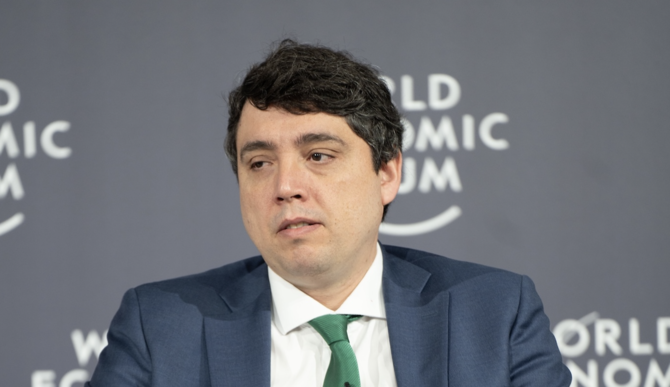
- Mendes stressed the importance of South-South cooperation, noting his country’s relationship with Egypt and Saudi Arabia
RIYADH: Pietro Mendes, Secretary of Oil, Gas and Biofuels at Brazil’s Ministry of Mines and Energy, confirmed on Monday that his country is on its way to joining the OPEC+ alliance.
Mendes’ announcement came during his participation in a session titled “Energy Demand: Transforming Costs into Profits” during the special meeting of the World Economic Forum held in Riyadh.
Brazil ranks ninth in the world in oil production at 3.25 million barrels per day.
“Brazil is joining OPEC+. So, the idea is to create cooperation because there (are) differences between regions and we don’t have just one single solution that comes from us or a union; we need to recognize all the solutions,” the Brazilian official said, adding while his country continues to produce oil and gas, it is simultaneously increasing reliance on renewable energies and adopting solutions to reduce emissions.
Mendes stressed the importance of South-South cooperation, noting his country’s relationship with Egypt and Saudi Arabia, where several initiatives are being developed for cooperation in biofuels and technology, including artificial intelligence, is being adopted to reduce carbon emissions.
‘Headquarters of your life’ coming to Saudi Arabia, says Wyndham Hotels regional president
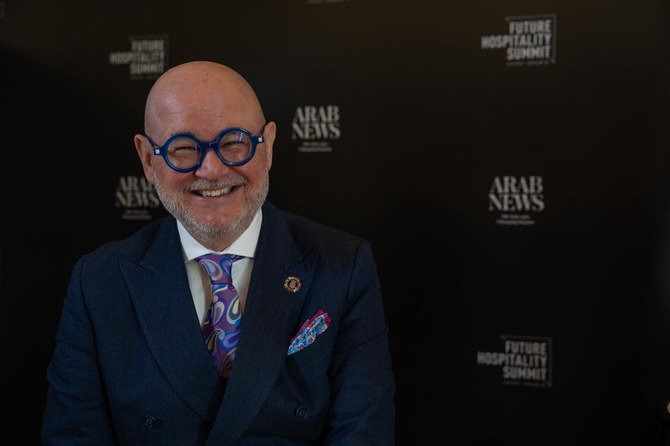
RIYADH: HQ, the new hospitality brand launched by Wyndham Hotels & Resorts and renowned hotelier Sam Nazarian, is set to arrive in Saudi Arabia by the end of 2025, Arab News has been told.
Dimitris Manikis, president of Europe, the Middle East, Eurasia and Africa, at the hospitality group, unveiled the company’s ambitious plans for the Kingdom – including the launch of HQ – at the Future Hospitality Summit in Riyadh.
Speaking to Arab News, Manikis shared insights into Wyndham’s steadfast commitment to Saudi Arabia’s flourishing hospitality landscape, saying: “We are very serious and very bullish about our presence in the Kingdom.”
He added: “We’re really excited to bring this new brand into Saudi Arabia as well, because it’s about smart luxury. It’s about F&B (food and beverage), entertainment, music, and it’s about smart hospitality as well.”
Manikis went on to say: “In the next 18 months, you’re going to have the first HQ brand in Saudi Arabia.”
Citing Nazarian’s track record of success with brands like Mondrian, Delano, and SLS, Manikis said: “Sam is notoriously famous for bringing up new concepts and ideas. So when I asked him: ‘What exactly is HQ and why would you call it brand HQ?’, he said: ‘I want the brand to be the headquarters of your life.’”
The President added: “I have no doubt whatsoever that HQ will be an amazing brand to grow in the GCC (Gulf Cooperation Council), and the Kingdom of Saudi Arabia in particular.”
Manikis reflected on Wyndham's impressive footprint across the Kingdom, which includes a robust pipeline of 20 upcoming projects. Notable among these ventures are the imminent openings of the Ramada hotels.
Additionally, the introduction of Wyndham Garden last year marked a significant milestone in the company’s strategic expansion efforts.
The optimism surrounding Saudi Arabia’s tourism prospects was palpable in Manikis’ remarks, citing the Kingdom’s remarkable achievement of surpassing the Vision 2030 tourism target of 100 million visitors in 2023.
“The bar has gone to 150 million tourists,” he remarked, highlighting Saudi Arabia’s accelerated progress towards becoming a global tourism destination.
However, he cautioned against neglecting the crucial role of infrastructure development in sustaining this growth momentum.
“Infrastructure, planes, airports, railways, roads, highways,” Manikis said, stressing the necessity of robust infrastructure to accommodate the influx of tourists.
Commending the government’s proactive measures, including the launch of a new airline and airport expansions, he expressed confidence in Saudi Arabia’s readiness to meet escalating demand.
“I do believe that the Kingdom of Saudi Arabia is actually going to fulfill the promise. And they're going to have an amazing Expo (2030). I don't think there's going to be any doubt about that,” he said.
As anticipation mounts for marquee events like the Expo and the FIFA World Cup in 2034, Manikis underscored the importance of post-event planning.
“It's not just about the event, it’s about what you do after,” he cautioned, advocating for sustainable strategies to leverage event infrastructure effectively beyond the festivities.
In addition to the HQ brand, Wyndham is poised to capitalize on the burgeoning extended stay segment.
“We are very bullish on extended stay,” Manikis stated, recognizing its potential to cater to diverse clientele, including families, business travelers, and digital nomads.
He added: “We added 11 beautiful luxury, extended stay products. And hopefully we’re going to extend the extended stay concept here in the Kingdom as well.”
IsDB, SFD, Arab Coordination Group join hands to raise $500m for education initiatives
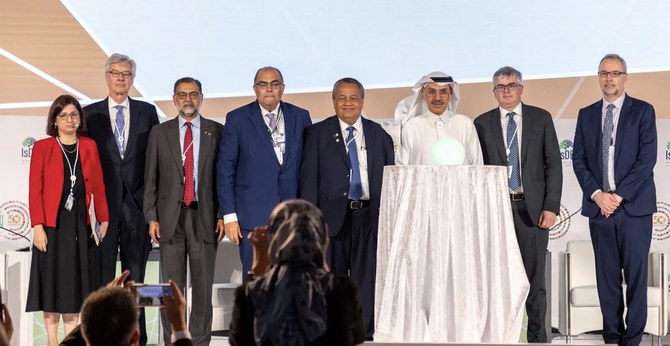
RIYADH: A global partnership involving the Islamic Development Bank will inject $500 million into educational initiatives across member countries of the Organization of the Islamic Cooperation.
During the annual meetings and golden jubilee celebrations of the IsDB, the Arab Coordination Group and the Saudi Fund for Development also joined The Global Partnership for Education, the Saudi Press Agency reported.
The Global Partnership for Education is a multi-stakeholder partnership and funding platform that aims to strengthen education systems in developing countries.
The amount will be raised by the Smart Finance for Education Initiative, an innovative financing tool.
Moreover, partners also pledged an additional $350 million to the initiative, including $150 million from the IsDB, $100 million from the Arab Bank for Economic Development in Africa, and $50 million from The Islamic Solidarity Fund for Development as well as $50 million from the Global Partnership for Education.
The initiative aims to enhance access to quality education in 37 OIC member countries, where 28 million children are without schooling.
Also at the event, the Islamic Corporation for the Insurance of Investment and Export Credit, a member of the IsDB concerned with providing Shariah-compliant insurance services, signed a retakaful agreement for a percentage of the shares allocated to Indonesia for the benefit of the country’s Eximbank.
A retakaful agreement is an Islamic reinsurance contract where takaful operators transfer a portion of their risk to a retakaful operator in compliance with Shariah principles.
The arrangement aims to provide strategic expertise and capabilities in the field of retakaful through a quota-sharing treaty specifically designed to support the launch of the financial institution’s new export credit takaful program product.
This comes as the business expected to be insured under this treaty is estimated at a value of $13 million during the year 2024.
During the IsDB annual meetings and jubilee celebrations, the bank’s president, Mohammed Sulaiman Al-Jasser, confirmed that the entity has designed a strategy for eco-conscious growth and low carbon reduction by supporting members to reach the zero-carbon goal.
Al-Jasser also pointed out that 40 of the bank’s projects are about renewable energy, green projects, and financing climate action.
He underlined the bank’s focus on green initiatives and sustainable development sukuk, indicating they are compatible with the Capital Markets Union standard.
The IsDB’s 2024 annual meetings are being held under the patronage of King Salman bin Abdulaziz in Riyadh from April 27 - 30.
The annual sessions coincide with IsDB’s golden jubilee, as the institution celebrates 50 years of promoting economic and social development in 57 member nations under the slogan “Taking pride in our past, shaping our future: authenticity, solidarity, and prosperity" reflecting the bank’s legacy and future goals.




